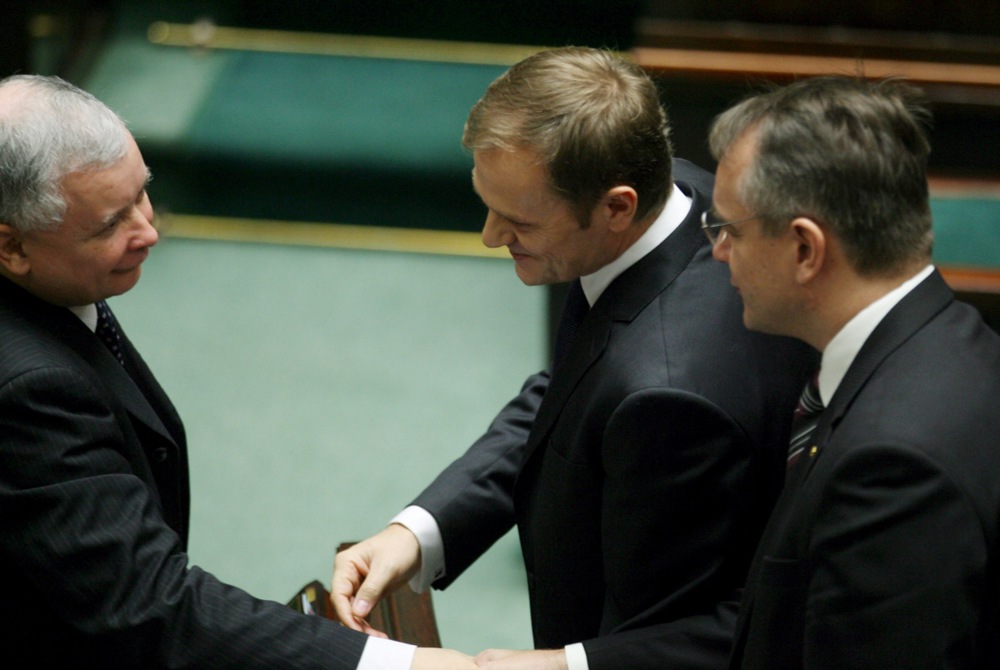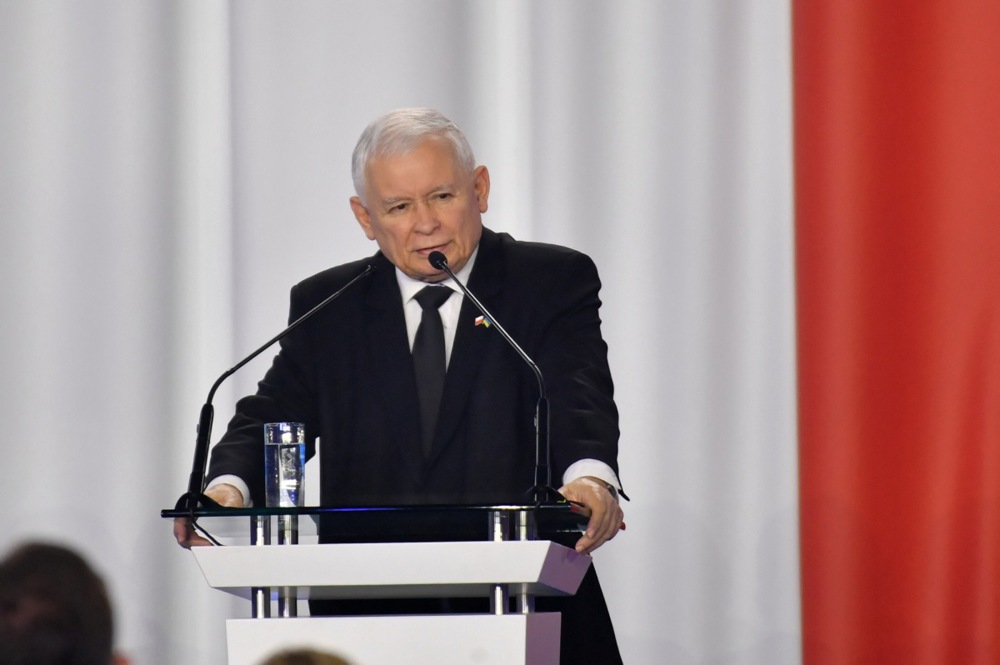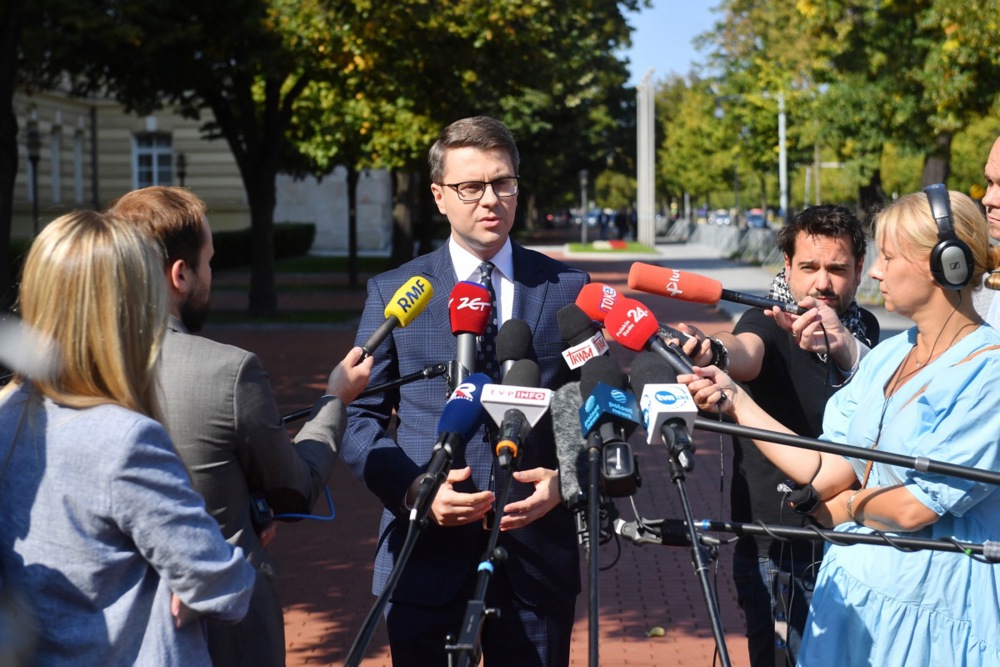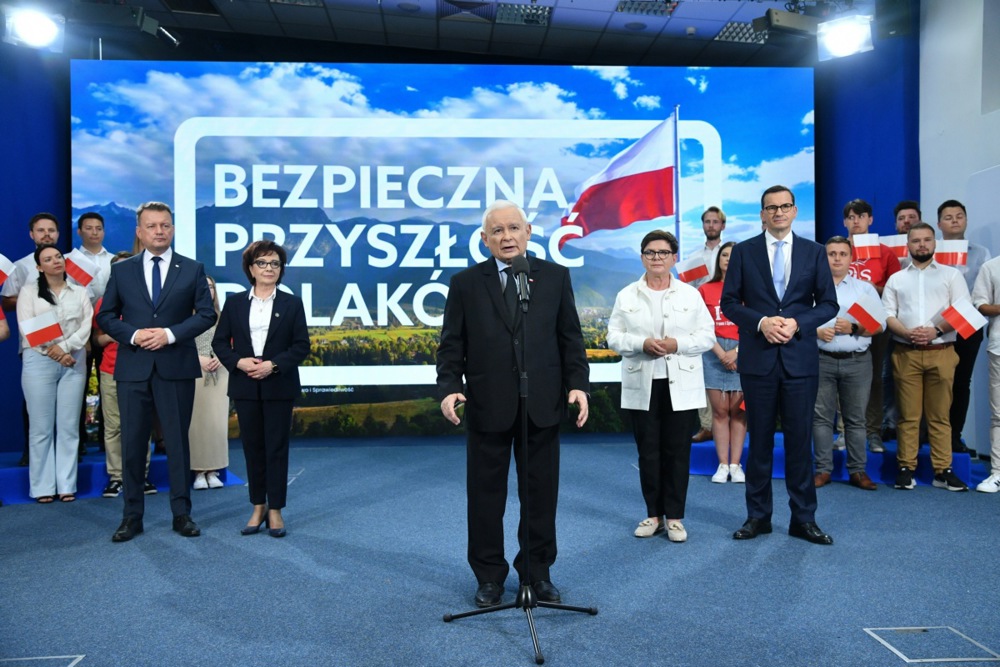Poland’s opposition block led by Donald Tusk has promised to criminally prosecute its political opposition in its election manifesto, which was published last week.
Tusk’s Civic Platform party-led alliance has accused a number of ruling Polish officials of engaging in criminal activity, up to and including violating the country’s constitution.
First on the prosecution list put forward by Tusk is Jarosław Kaczyński, Deputy PM and the leader of the ruling Conservative PiS party, who they accuse of “leading a conspiracy aimed at changing the constitutional system of government in Poland”.
Other big names listed as requiring prosecution include President Andrzej Duda, PM Mateusz Morawiecki and the head of the central bank Adam Glapiński.
Apart from vowing to try ruling politicians over alleged criminality, the group has vowed to significantly increase public spending. The manifesto includes spending commitments which some have estimated would cost an extra 25 billion euros.
Tusk has vowed to give public sector workers pay increases of 20 per cent, with teachers receiving a 30 per cent hike.
The opposition has also suggested implementing zero per cent rated mortgages for first-time buyers, free IVF treatment for women, abortion on demand until the 12th week of pregnancy, and the return of generous pension provisions for former communist security forces that were cut by the current government.
There will be tax cuts too with the abolition of capital gains tax and the doubling of the income tax allowance from 30,000 to 60,000 PLN (13,000 Euro).
The cost of the spending splurge to the state budget, according to Onet.pl, would be around 100 billion PLN (25 billion Euro) and it is not obviously apparent where that money would come from.
Speaking at a rally in Tarnów, southern Poland, Donald Tusk claimed that the spending would be paid for by tackling government waste and alleged excessive spending on public administration.
But his bloc’s programme only includes commitments to cut support to the Catholic Church, as well as what the document describes as “nationalist organisations”.
The ruling Conservatives (PiS) also published their programme on 9 September. The party is bidding for an unprecedented third consecutive term in office after eight years of successful government.
Its 300-page programme consists of an exposition of the government’s achievements and a detailed programme of government for the next eight years.
PiS’s term in power has seen unemployment fall from almost 15 per cent to five per cent, GDP growing at an average of five per cent per year, and the introduction of a number of social transfers which have helped in increasing people’s incomes ahead of rising prices.
The document claims PiS has fixed public finances so that collected revenues could be used to pursue active social and investment policies. It also claims the government has ensured military and energy security for Poland by ramping up spending on the armed forces and ensuring the country diversified its sources of energy supply.
In a pitch for older voters, PiS promises to introduce the opportunity for people to claim their state pensions after a set number of working years (38 for women and 43 for men) even if they have not reached the statutory retirement age of 65 for men and 60 for women.
The programme confirms the policy pledges announced earlier such as the 60 per cent rise in universal child benefit, free prescriptions for all over 65s and under-18s and the scrapping of tolls on Poland’s motorways.
The election platforms of Poland’s main opposition bloc led by Donald Tusk and the ruling Conservative PiS differ sharply on Poland’s future in the EU.
Tusk’s bloc promises to “return Poland to the group which controls European institutions”, a promise to return to the policies pursued by the last Liberal government (2007-2015) of staying close to Germany and France, while also alluding to the fact that Tusk’s party is a member of the European Parliament’s largest grouping, the EPP.
The opposition pledges it will unlock Poland’s EU funding and obtain funding for defending Poland’s border with Belarus. It has also promised to fully comply with all the rulings of the European Court of Justice, including the edicts of the European courts on Poland’s judicial reform.
There is no mention of the EU migration pact or a possible Polish entry into the Eurozone. Tusk’s group also does not take any position on Member State vetoes.
The last government led by Tusk was in favour of Poland joining the Eurozone and it also accepted the 2014 EC proposal to relocate migrants, something that was rejected by the incoming PiS government in 2015.
PiS in its programme commits itself to pursuing Poland’s national interest and institutional reform of the EU so that it is a union of sovereign states rather than a federation. It opposes giving more powers to the EC and the European courts.
Addressing the party faithful on 9 September in Końskie, southern Poland, current Deputy PM Jarosław Kaczyński said that Poland would not return to being “a client state just for the sake of personal advancement of its rulers”, referring to Tusk’s ascent to the job of President of the European Council in 2014.
The PiS leader also said that “a nation cannot develop without having its own state” and that Poland would not allow itself to repeat the painful experience of losing statehood inside the EU.
In order for the “Member States to be in control of the treaties of the EU” PiS proposes to introduce a mechanism inside the EU that would allow at least two states to challenge any EU competence and have the European Council debate the matter.
Poland’s ruling party opposes any removal of the national right of veto over EU foreign and security policy matters. It wants the EU to be enlarged while at the same time withdrawing from competencies where there is no demand for intervention by Brussels.
PiS wants to reinforce the rights of individual member states by giving them the power to trigger referendums on European legislation in their own countries which, if the required turnout is achieved, would mean the legislation would be stopped.
The experience PiS has gained in disputes with the EC and ECJ, which it claims has been one of being treated differently to the older member state on judicial reform, has led it to advocate that any legal action pursued by against a member state should contain an analysis of how such a matter is handled in other countries.
The party has increased its lead ahead of the 15 October election from five to eight per cent, according to a poll of polls.





